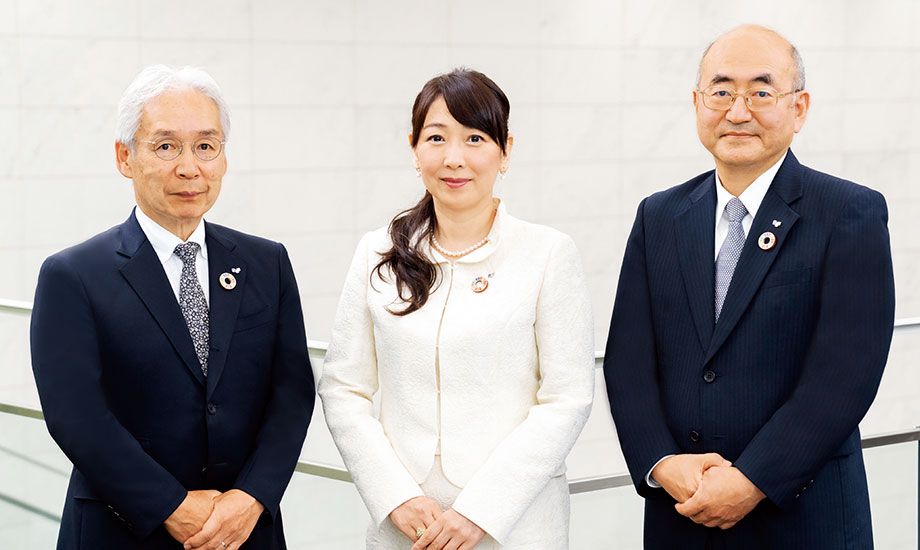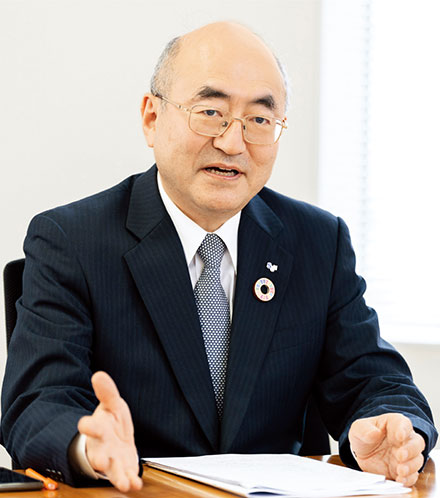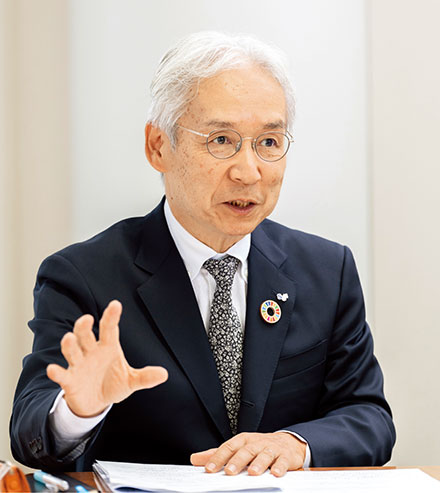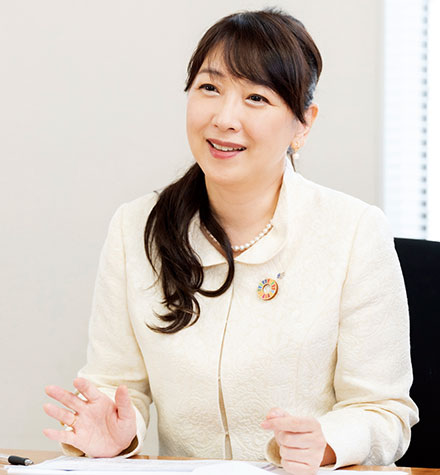Discussion by the three Outside Directors

Masato Akiyama Outside Director
Worked at Nichirei Corporation, Nichirei Logistics Group Inc., Logistics Network, Inc. and Tokyo Danchireizo Co. After serving at Tokyo Association of Refrigerated Warehouses and Japan Association of Refrigerated Warehouses, was appointed as Director of the Company in June 2020.
Mika Takaoka Outside Director
After serving as Assistant Professor of Institute of Economic Research at Osaka City University, now Professor of the College of Business of Rikkyo University. Also currently serving as Outside Director at Mos Food Services, Inc. and Kyodo Printing Co., Ltd. Was appointed as Director of the Company in June 2018.
Osami Sagisaka Outside Director
Worked in the Ministry of Home Affairs, the Fire and Disaster Management Agency and the Ministry of the Environment, before serving as a part-time lecturer at Waseda University and a Consultant at Hideaki Ozawa Law Office. Served as Vice Chairman of Emergency Medical Network of Helicopter and Hospital (HEM-Net) and Chairperson of Saitama International Association. Was appointed as Director of the Company in June 2019.
Soundly supporting initiatives aimed at the realization of the “New Long-term Vision”
We asked our Outside Directors, Mika Takaoka, Osami Sagisaka and Masato Akiyama to discuss SG Holdings’s new Long-term Vision, new Mid-term Management Plan and governance.
About SG Holdings Group
What kind of company do you see SG Holdings Group to be?
Takaoka: Corporate management requires “will,” or an active intent to achieve things. I feel that SG Holdings is a company that has such will, and I always feel that point is wonderful. The new Long-term Vision “Grow the new Story: New logistics, nurturing a new society together” established in March 2022 reflects management’s strong belief with a view to the future.
Although SG Holdings Group is a major company with over 90,000 employees, they are constantly facing ahead without being excessive defensive, the trap which many large companies in Japan often fall into. At meetings of the Board of Directors, I frequently hear comments such as “Isn’t this the same as last year?” and “Business and people must grow over this year.” I think business based on existing approaches no longer works amid the current increasing uncertainty concerning social conditions and significant changes in the business environment. It is important to have a stance of making improvements while keeping an eye on other companies, but it is also important to have a stance of embracing new challenges with strong conviction to write a new story, and I feel that awareness of this has become increasingly heightened in the process of creating the new Long-term Vision.

Sagisaka: I completely agree. The world has entered an era of feeling anxiety in which the economy and society are undergoing significant changes, and I think the Group must make very difficult decisions on how to turn as a leading Japanese logistics company. I think it is wonderful that the Group has clearly indicated the path for logistics and the Group by presenting a Long-term Vision aimed at 2030 amid such conditions. The free and vigorous corporate culture also comes across through the Group’s newsletters. Management takes the initiative to gather together junior employees and actively absorb opinions from the workplace and the utilization of their creative ideas can be felt in a variety of situations. In such company, I feel that the next generation of management will also emerge one after another from among such junior employees as the entire Group grows.
I believe the Group was able to firmly grasp business opportunities such as the e-commerce demand that has expanded due to the COVID-19 pandemic because they have steadily implemented initiatives utilizing a wide range of information and the latest technology, such as the groupwide deployment of information like that put in practice by GOAL, which is an advanced logistics project eam spanning the Group, and X FRONTIER serving as a next-generation large-scale distribution center.
Akiyama :I think a strength of the Group is coordination and governance of Group companies under SG Holdings as a holding company functioning very well. For example, if a report on a project of a Group company not progressing well is made to the Board of Directors, it is strictly investigated, and appropriate instructions are given after thorough discussion. In the case of large investments, their content is stringently checked, including analysis from a long-term perspective. As a shareholder, SG Holdings conducts detailed supervision of the management of each Group company in which they invested. This is something I strongly felt again in meetings of the Board of Directors over the past year.
I also think the new Long-term Vision is very good. The wording of “nurturing a new society together” gives the impression of the desire to not only achieve profits and growth as a company, but to prosper with the environment and society, and also conveys the intention to respect each other and grow together, including partner companies. In that sense, I think this vision is a vision that will strongly resonate with Group employees and provide them with encouragement. Conducting business with such a vision will result in being accepted by society, leading to the Group gaining a competitive advantage.
Governance and effectiveness of the Board of Directors
How do you assess SG Holdings Group’s governance and the Board of Directors?
Takaoka: As Mr. Akiyama mentioned, the Group’s governance is functioning well, and I also believe that the Board of Directors has a high level of effectiveness. This fiscal year, meetings for exchanging opinions among outside officers were also established. Although Outside Directors and Outside Audit & Supervisory Board Members had frequent opportunities to hold discussions on occasion, outside officers exchanging frank opinions on SG Holdings’ management plans and various systems in situations without people in a position of executing business is also in line with the intent of the Corporate Governance Code. As such, I think it could be said that the Group’s governance has been strengthened further over the past year.
Meanwhile, there are also some issues. Due to the growth of the overseas business represented by Sri Lanka-based Expolanka, which handles the Logistics Business, I recognize that governance of overseas subsidiaries is an issue for the future. Expolanka has become a key subsidiary of the Group due to the rapid expansion of sales. Going forward, the Group must have proper discussions and take steps on how to assemble and operate governance of overseas subsidiaries.
It is also important that Group employees numbering over 90,000 steadily comply with laws and regulations while maintaining and improving their awareness of compliance. The Board of Directors must also continuously supervise compliance including reviews of systems.
Sagisaka: I have the impression that the speed information reaches the Board of Directors is fast for a large company. Being a company operating such a large business, it is obviously impossible to fully eliminate accidents. Rather, it is important to establish systems for minimizing risks after something occurs. In this respect, I believe the Group’s risk management systems and the mechanism for the Board of Directors detecting significant risks are also very good. Furthermore, we, Outside Directors, have opportunities to gain information from within the company other than in board meetings. Coming in contact with a variety of information also leads to deeper discussion in the Board of Directors.
However, I think such information is mostly information on domestic business, with comparatively little information on overseas business. Strengthening of international and overseas services is also an important theme mentioned in the new Mid-term Management Plan and establishing international auditing and supervisory systems is an important issue for the future as pointed out by Ms. Takaoka, so I think there is room to take action.

Akiyama: As you have both said, I also get the impression that governance is working well in Japan. I feel that the group can resolve any problems that arise. However, there are issues overseas. Expolanka is a listed company, and if systems are put in place, I don’t think it would be difficult to enhance them, but it will be necessary to come up with ideas and inject management resources to ensure governance works in operations in Southeast Asia and East Asia. The key to this is development of personnel. At the current business size, it is probably necessary to accumulate almost 100 overseas personnel, cultivate them to send on site when needed such as grasping business opportunities and responding in the event of an accident. In that sense, it is necessary to formulate and implement a specific plan including career recruitment, education and local recruitment. If that can be done, I think governance will also function overseas.
Expectations of the new Mid-term Management Plan “SGH Story 2024”
What kind of impressions do you have of the new Mid-term Management Plan (New Plan)?
Sagisaka: The strategy I have the greatest expectations for in the New Plan is investment in DX. There are Group companies that handle digital technology, but I have great expectations that producing results here will lead to further growth of the Group as a whole.
Another is the promotion of services aimed at solving social and environmental issues such as decarbonization. Contributing to the realization of sustainability of society and enhancing its performance as a result will lead to expansion of the Group’s business. Sagawa Express, which is a core Group company, has been engaged in pioneering initiatives to address environmental issues for considerable time, such as the introduction of environmentally friendly vehicles such as LNG trucks and hybrid trucks. In future, the Group should more actively highlight the fact that it is a company contributing to society and the environment.
Akiyama: Brushing up domestic business and engaging in new business is obvious, but I don’t think this will lead to future growth unless the Group gets serious about the overseas business. With regard to new business, rather than providing completely new services, it is important to use existing infrastructure and technology to conduct business in new areas.
Furthermore, as mentioned in the New Plan, investment in human capital is extremely important. The Group has employees of diverse foreign nationalities, but they should be increased more in future with a view to acceleration of overseas expansion. A variety of conflict may arise at first, but there should be a lot of leaning from this. In addition, with respect to the enhancement of governance, it is important to develop personnel who are able to conduct management properly.
Takaoka: The New Plan was formulated and announced alongside the new Long-term Vision. The New Plan is positioned as the first three years aimed at the new Long-term Vision and has been drawn up to be forward-looking. It paints a picture increasing productivity of the express package delivery services business and growing businesses other than express package delivery services by 2030, and we will supervise whether the New Plan is steadily progressing toward this goal. It is a period for sowing the seeds of new business, so I would like to see that seeds are sown for open innovation platforms, personnel development and uncovering the needs of partners.
Meanwhile, it is also vital to make a profit to provide returns to shareholders and increase corporate value. We will provide checks based on the fact that making good progress with these will lead to the achievement of the new Long-term Vision.
Expectations on the SG Holdings Group
What kind of expectations do you have on the SG Holdings Group’s future efforts?
Sagisaka: Until now, the Group has made profits centered on the business of express package delivery services, but they will aim to expand business driven by the expansion of businesses other than express package delivery services in future. The Logistics Business grew rapidly in fiscal 2021 due to the impact of COVID-19 and strong performance of the overseas business, and I think gradually proceeding with diversification is desirable from a long-term perspective. As indicated by the wording of “nurturing together” in the new Long-term Vision, it is important to respect the management of partner companies and grow together. In addressing the environmental issue of carbon neutrality, it is important to engage them and nurture together our efforts to reduce Scope 3 CO2 to achieve it. I think the Group has a corporate culture that places importance on its employees, but I would like it to become a company that nurtures a better society with partner companies and customers with a view to the future.

Takaoka: The Group envisages growth reaching net sales of 2.2 trillion yen in fiscal 2030. To achieve this, it is important to increase productivity through the utilization of X FRONTIER and the utilization of DX in the domestic Delivery Business. Meanwhile, in areas other than the Delivery Business that should be grown steadily, I think these are areas where the growth of partners holds the key rather than simply handling them in-house. Specifically, I think the Group can pursue possibilities with partner companies and customers with potential needs in many areas such as the environment, healthcare, finance, logistics processing and global.
Expansion into a variety of businesses is conceivable as long as the company do not dwell on transporting things. Going forward, I think it would be befitting for the Group to expand business by resolving one issue at a time, placing importance on the corporate culture of facing customers’ issues head on. As I mentioned at the beginning, having strong will is important in management. How should society advance and what kind of value can the Group provide to customers in that process? How can we build the most productive method or system among the methods for providing that value? The Group has proceeded with intent until now, but I would like to unwaveringly promote transformation of the business portfolio.
Akiyama: I think using solutions as our weapons will lead to “nurturing a new society together.” Contributing to streamlining through logistics solutions of a new era such as those currently provided to customers through GOAL will lead to reduction of CO2 emissions from logistics and also lead to the reduction of the Group’s Scope 3 emissions.
Expolanka also has great potential. I pointed out the issues related to governance of the overseas business earlier, but I believe resolving these issues, smoothly linking Expolanka’s business to other businesses, and skillfully utilizing Expolanka’s global network present significant room for growth that will lead to future business opportunities.
As Ms. Takaoka said, I feel strong will in the Group’s management. In addition, the Group is also strengthened by the presence of employees who possess the ability to sleekly implement this and the resolve to build up a sweat when needed. Because it is such a company, I believe it can overcome a variety of challenges.





